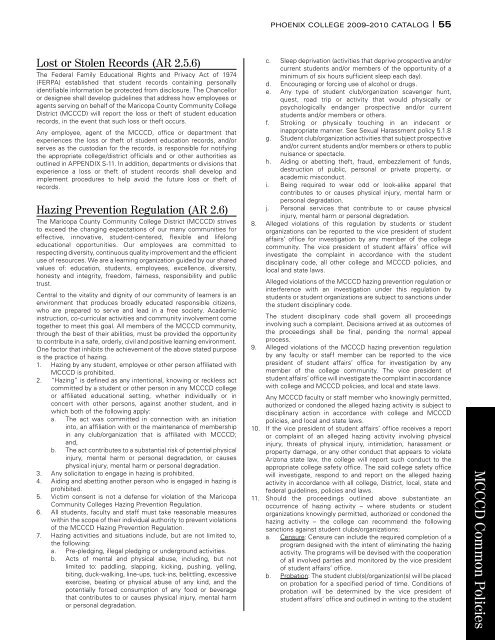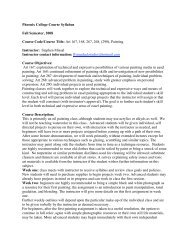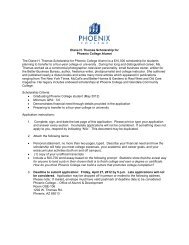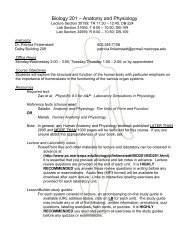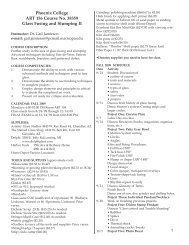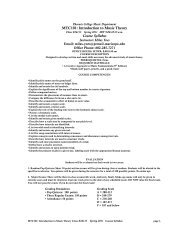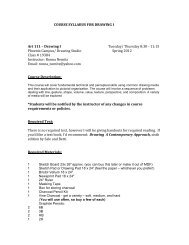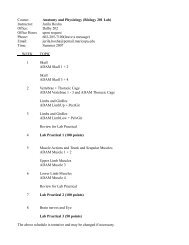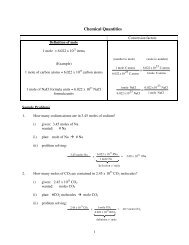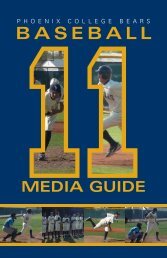Phoenix College Catalog 2009-10
Phoenix College Catalog 2009-10
Phoenix College Catalog 2009-10
You also want an ePaper? Increase the reach of your titles
YUMPU automatically turns print PDFs into web optimized ePapers that Google loves.
<strong>Phoenix</strong> <strong>College</strong> <strong>2009</strong>–20<strong>10</strong> CATALOG | 55<br />
Lost or Stolen Records (AR 2.5.6)<br />
The Federal Family Educational Rights and Privacy Act of 1974<br />
(FERPA) established that student records containing personally<br />
identifiable information be protected from disclosure. The Chancellor<br />
or designee shall develop guidelines that address how employees or<br />
agents serving on behalf of the Maricopa County Community <strong>College</strong><br />
District (MCCCD) will report the loss or theft of student education<br />
records, in the event that such loss or theft occurs.<br />
Any employee, agent of the MCCCD, office or department that<br />
experiences the loss or theft of student education records, and/or<br />
serves as the custodian for the records, is responsible for notifying<br />
the appropriate college/district officials and or other authorities as<br />
outlined in APPENDIX S-11. In addition, departments or divisions that<br />
experience a loss or theft of student records shall develop and<br />
implement procedures to help avoid the future loss or theft of<br />
records.<br />
Hazing Prevention Regulation (AR 2.6)<br />
The Maricopa County Community <strong>College</strong> District (MCCCD) strives<br />
to exceed the changing expectations of our many communities for<br />
effective, innovative, student-centered, flexible and lifelong<br />
educational opportunities. Our employees are committed to<br />
respecting diversity, continuous quality improvement and the efficient<br />
use of resources. We are a learning organization guided by our shared<br />
values of: education, students, employees, excellence, diversity,<br />
honesty and integrity, freedom, fairness, responsibility and public<br />
trust.<br />
Central to the vitality and dignity of our community of learners is an<br />
environment that produces broadly educated responsible citizens,<br />
who are prepared to serve and lead in a free society. Academic<br />
instruction, co-curricular activities and community involvement come<br />
together to meet this goal. All members of the MCCCD community,<br />
through the best of their abilities, must be provided the opportunity<br />
to contribute in a safe, orderly, civil and positive learning environment.<br />
One factor that inhibits the achievement of the above stated purpose<br />
is the practice of hazing.<br />
1. Hazing by any student, employee or other person affiliated with<br />
MCCCD is prohibited.<br />
2. “Hazing” is defined as any intentional, knowing or reckless act<br />
committed by a student or other person in any MCCCD college<br />
or affiliated educational setting, whether individually or in<br />
concert with other persons, against another student, and in<br />
which both of the following apply:<br />
a. The act was committed in connection with an initiation<br />
into, an affiliation with or the maintenance of membership<br />
in any club/organization that is affiliated with MCCCD;<br />
and,<br />
b. The act contributes to a substantial risk of potential physical<br />
injury, mental harm or personal degradation, or causes<br />
physical injury, mental harm or personal degradation.<br />
3. Any solicitation to engage in hazing is prohibited.<br />
4. Aiding and abetting another person who is engaged in hazing is<br />
prohibited.<br />
5. Victim consent is not a defense for violation of the Maricopa<br />
Community <strong>College</strong>s Hazing Prevention Regulation.<br />
6. All students, faculty and staff must take reasonable measures<br />
within the scope of their individual authority to prevent violations<br />
of the MCCCD Hazing Prevention Regulation.<br />
7. Hazing activities and situations include, but are not limited to,<br />
the following:<br />
a. Pre-pledging, illegal pledging or underground activities.<br />
b. Acts of mental and physical abuse, including, but not<br />
limited to: paddling, slapping, kicking, pushing, yelling,<br />
biting, duck-walking, line-ups, tuck-ins, belittling, excessive<br />
exercise, beating or physical abuse of any kind, and the<br />
potentially forced consumption of any food or beverage<br />
that contributes to or causes physical injury, mental harm<br />
or personal degradation.<br />
8.<br />
9.<br />
<strong>10</strong>.<br />
11.<br />
c. Sleep deprivation (activities that deprive prospective and/or<br />
current students and/or members of the opportunity of a<br />
minimum of six hours sufficient sleep each day).<br />
d. Encouraging or forcing use of alcohol or drugs.<br />
e. Any type of student club/organization scavenger hunt,<br />
quest, road trip or activity that would physically or<br />
psychologically endanger prospective and/or current<br />
students and/or members or others.<br />
f. Stroking or physically touching in an indecent or<br />
inappropriate manner. See Sexual Harassment policy 5.1.8<br />
g. Student club/organization activities that subject prospective<br />
and/or current students and/or members or others to public<br />
nuisance or spectacle.<br />
h. Aiding or abetting theft, fraud, embezzlement of funds,<br />
destruction of public, personal or private property, or<br />
academic misconduct.<br />
i. Being required to wear odd or look-alike apparel that<br />
contributes to or causes physical injury, mental harm or<br />
personal degradation.<br />
j. Personal services that contribute to or cause physical<br />
injury, mental harm or personal degradation.<br />
Alleged violations of this regulation by students or student<br />
organizations can be reported to the vice president of student<br />
affairs’ office for investigation by any member of the college<br />
community. The vice president of student affairs’ office will<br />
investigate the complaint in accordance with the student<br />
disciplinary code, all other college and MCCCD policies, and<br />
local and state laws.<br />
Alleged violations of the MCCCD hazing prevention regulation or<br />
interference with an investigation under this regulation by<br />
students or student organizations are subject to sanctions under<br />
the student disciplinary code.<br />
The student disciplinary code shall govern all proceedings<br />
involving such a complaint. Decisions arrived at as outcomes of<br />
the proceedings shall be final, pending the normal appeal<br />
process.<br />
Alleged violations of the MCCCD hazing prevention regulation<br />
by any faculty or staff member can be reported to the vice<br />
president of student affairs’ office for investigation by any<br />
member of the college community. The vice president of<br />
student affairs’ office will investigate the complaint in accordance<br />
with college and MCCCD policies, and local and state laws.<br />
Any MCCCD faculty or staff member who knowingly permitted,<br />
authorized or condoned the alleged hazing activity is subject to<br />
disciplinary action in accordance with college and MCCCD<br />
policies, and local and state laws.<br />
If the vice president of student affairs’ office receives a report<br />
or complaint of an alleged hazing activity involving physical<br />
injury, threats of physical injury, intimidation, harassment or<br />
property damage, or any other conduct that appears to violate<br />
Arizona state law, the college will report such conduct to the<br />
appropriate college safety office. The said college safety office<br />
will investigate, respond to and report on the alleged hazing<br />
activity in accordance with all college, District, local, state and<br />
federal guidelines, policies and laws.<br />
Should the proceedings outlined above substantiate an<br />
occurrence of hazing activity – where students or student<br />
organizations knowingly permitted, authorized or condoned the<br />
hazing activity – the college can recommend the following<br />
sanctions against student clubs/organizations:<br />
a. Censure: Censure can include the required completion of a<br />
program designed with the intent of eliminating the hazing<br />
activity. The programs will be devised with the cooperation<br />
of all involved parties and monitored by the vice president<br />
of student affairs’ office.<br />
b. Probation: The student club(s)/organization(s) will be placed<br />
on probation for a specified period of time. Conditions of<br />
probation will be determined by the vice president of<br />
student affairs’ office and outlined in writing to the student<br />
MCCCD Common Policies


